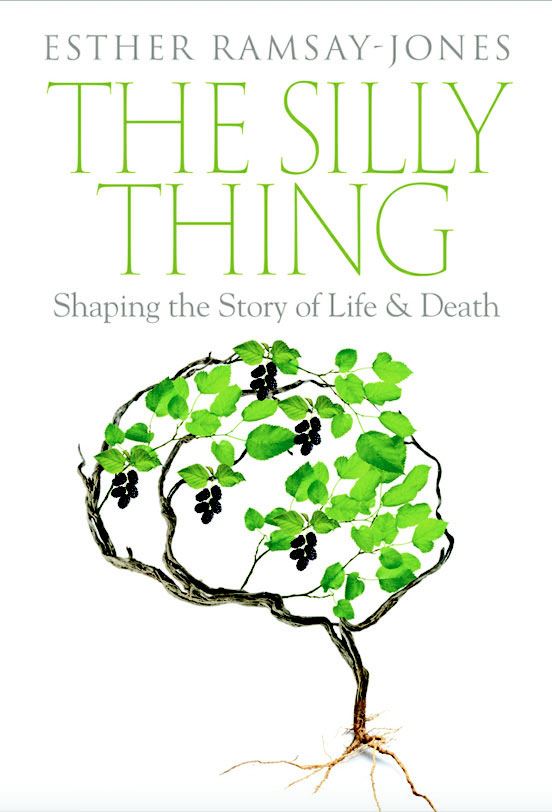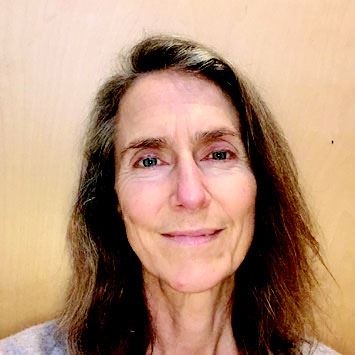Book Review: The Silly Thing: Shaping the Story of Life and Death
by Esther Ramsay Jones

Published by Free Association Books (2020) Kindle edition.
ISBN-13: 978-1911383444
reviewed by Áine Hutchinson
My mother had in fact been a knitter: a knitter is someone who can sit still for hours at a time, undoing and redoing until a piece is complete. It was as if she were doing this in conjunction with me, as many of my clients do, creating some sort of blanket of her life.
(Chapter: Living with Uncertainty, para. 6.)
April 2020, Covid-19 and the UK lockdown, Esther Ramsay-Jones’ preface points to the desperate need for the anchoring moments of relatedness, especially during this pandemic. Six months later, I read this book as globally our relationship with dying seems forever changed. This book is beautifully written as both daughter and psychotherapist, where the author’s vast experience in palliative care sees “clarity about the poetry of who we are” (Introduction, para. 1). A psychodynamic counsellor and psychotherapist, and an associate lecturer in ‘Death, Dying and Bereavement’ at the Open University, this book is a testament to how “we can be at our most vital in the midst of desperate impending pain” (Chapter: Diagnosis, para. 11). There are other families’ accounts alongside, all conveying the experiences of palliative care, interspersed with quotes from academics and poets. Esther wrote this book with the encouragement of her mother, Joyce Margaret Jones, and this clarity shone throughout its 200 pages. ‘Silly thing’ is the name Joyce gave to her terminal brain tumour, with its drive to survive rendering it silly enough to kills its life source. Joyce, an English teacher, had always feared losing her speech and cruelly this tumour was in her language centre. This intimate, moving story is both memoir and educational, on how a mother may enter “into a glazed world of suspended time” (Introduction, para. 6).
The author carefully shares this deeply personal story, while also giving a professional perspective on what we may face. The contents page signposts the crucial questions that are encountered: Diagnosis; Living with Uncertainty; Living Plans: Heroics; Dying Plans: Stoics; A Good Death? The difficult conversations in the Diagnosis chapter explore the early stage of anticipatory grief, the coping mechanisms of hope and humour, the importance of language, and how professionals relate. With heart-wrenching delicate detail the author describes how Joyce’s life is changed forever. The chapter of Living with Uncertainty shows how torturous the road ahead may seem. The new routines, the absence of small or forbidden pleasures, the pains, and how the agency of the dying person is kept central. The policy and practice around advance care planning, within the nuances of family systems, and the ethical question to tell, or not to tell. The complexity of client autonomy, and how open talking, choice and control are negotiated is brutally illustrated. The simplicity of a sugary biscuit, once a shared joy between a married couple, now viewed as a risk, and how it symbolises the choices:
But back to this biscuit, with its crispy bite: I realise that it is imbued with conflicting meaning. I see it as a gift in some ways – part of this wonderful newly emerging quality of life that Mum has with my father at 3am – and a curse, the strange, possibly deadly, pleasure that may or may not make those glioblastoma cells grow even faster than they might be doing already.
(Chapter: Living with Uncertainty, para. 37).
The subsequent chapter, Living Plan: Heroics, brings in the themes of shame and authenticity in how palliative care is provided, highlighting the medicalisation of death and the navigating of those systems, and how “the presence of basic humanity is not often captured by policymakers.” (Chapter: Diagnosis, para. 21). The impact of death on children, and “the intimacies and relentlessness of care and being a carer” (Chapter: Living Plans: Heroics, para. 50), is written with such rawness about the author’s father and her own children.
I think of the many models of grief we psychotherapists have at our disposal (see chapter 4, Freud, 1917; Kubler-Ross, 1969; Worden, 1991; Stroebe & Schutt, 1995/6; Klass, 1996) and wonder where Dad will find himself among these carefully conceptualised theories.
(Chapter: Living with Uncertainty, para. 19).
The approaching death and the chapter, Dying Plans, subtitled Stoics, examines emerging thoughts on peace and psycho-spirituality, as the agonising decline and dependency begins. The final chapter, A Good Death? asks those questions which may be left for the living, namely, were the dying wishes met? The grieving, the absence and the ‘what ifs’. The author brings her full personal experience into being in exploring the issues for professionals, and not just psychotherapists, with a closing piece on childhood grief and the significance of creativity. The author creatively uses the metaphor of a blanket, with its Latin origins, pallium, which means to cloak, illustrating the recognised need for that cloak of comfort and care for all experiencing death.
Yet applying this metaphor to therapeutic work with the dying is a little idealised, too neat and tidy: sometimes people die with loose threads left behind for family, leaving them bewildered, confused and saddened.
(Chapter: Living with Uncertainty, para. 7).
The voice of the dying and bereaved speaks from this book, with words for all, especially those professionals and policy makers within palliative care. The breadth of references reflects the depth of resources from which the author draws, from poetry to policy guidelines. Written with tender rawness, it is invaluable for those working with the bereaved, the dying, and facing our own personal losses throughout our professional lives. A book indeed for this time.

Áine Hutchinson MIAHIP, MIACP is a Humanistic and Integrative Psychotherapist working privately in Cloughjordan Ecovillage, Tipperary and Limerick. Her MSc in Existential Psychotherapy and thesis on Birth Trauma embodied her particular intrigue with transgenerational trauma, loss and biosynthesis. Áine can be contacted at: 087 2921790, aine@hutchinson. work, https://aine.hutchinson.work.
IAHIP 2021 - INSIDE OUT 93 - Spring 2021

